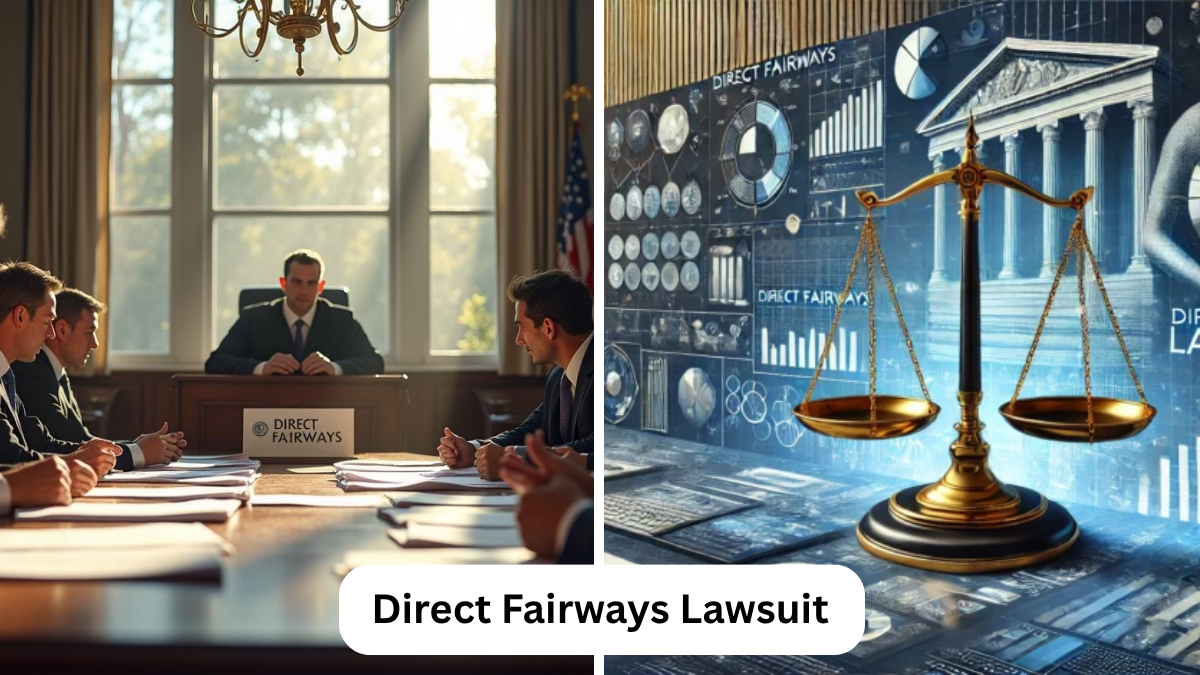Introduction to the Direct Fairways Lawsuit
The phrase direct fairways lawsuit has gained attention in business, legal, and marketing circles due to its association with controversies surrounding Direct Fairways, a company known for offering advertising services within the golf industry. The lawsuit became a talking point not only because of its direct impact on the company and its clients but also because it raised broader questions about business ethics, consumer rights, and fair marketing practices.
Lawsuits involving marketing or advertising companies are not uncommon, but when they involve allegations of misrepresentation, aggressive tactics, or consumer dissatisfaction, they capture public interest. The direct fairways lawsuit serves as a case study for how companies can face legal scrutiny when clients feel their trust has been broken.
Background of Direct Fairways
Direct Fairways is a marketing company that positioned itself as a specialized provider of promotional services for golf courses and businesses associated with the golfing community. Their business model revolved around selling advertising space in golf-related media such as course guides, scorecards, and golf directories. By targeting local businesses who wished to appeal to golfers, Direct Fairways offered what appeared to be a niche but potentially effective form of advertising.
At first glance, this business model seemed straightforward and beneficial for all parties: golf courses received support in the form of sponsored materials, local businesses gained exposure, and Direct Fairways managed the production and distribution. However, as the direct fairways lawsuit later highlighted, challenges began to emerge in the areas of transparency, delivery, and client satisfaction.
The Nature of the Direct Fairways Lawsuit
The direct fairways lawsuit arose from a series of complaints filed by clients who alleged that the company had engaged in misleading or unfair practices. Many of these complaints focused on claims that the promised advertising exposure did not materialize as described. For example, some clients argued that they were led to believe their advertisements would reach larger or more relevant audiences than they actually did.
Other clients raised concerns about aggressive sales tactics. Reports indicated that sales representatives allegedly pressured businesses into contracts by emphasizing urgency or overstating the potential benefits. These factors collectively formed the foundation for the legal disputes that came to be known as the direct fairways lawsuit.
While the lawsuit primarily revolved around contract disputes and advertising promises, it quickly expanded into a larger conversation about accountability in niche marketing industries.
Legal Arguments and Issues Raised
The direct fairways lawsuit brought to the forefront several important legal issues that are common in disputes between businesses and service providers. These included:
- Misrepresentation: Were clients misled about the scope, reach, or effectiveness of their advertising campaigns?
- Contractual Obligations: Did Direct Fairways deliver the products and services promised in signed contracts?
- Sales Practices: Were the company’s sales tactics ethical, and did they respect the decision-making freedom of potential clients?
- Consumer Protection: Did the clients, many of whom were small businesses, have adequate protection under consumer rights laws?
These questions made the lawsuit more than just a matter of private dispute—it became a case with implications for the broader marketing and advertising world.
Impact on Small Businesses
One of the most striking aspects of the direct fairways lawsuit was the impact on small businesses. Many of the clients who raised complaints were local business owners who invested in advertising with the hope of reaching new customers. For small enterprises, every marketing dollar counts, and when they felt they did not receive value for their money, the financial and emotional toll was significant.
The lawsuit highlighted how vulnerable small businesses can be in dealings with larger or more aggressive marketing firms. It underscored the importance of due diligence, contract review, and clear communication in business partnerships. For some, the lawsuit served as a painful but important reminder of the need to safeguard their interests in the marketplace.
Reputation and Industry Perception
As news of the direct fairways lawsuit spread, it inevitably affected the company’s reputation. Allegations of misrepresentation and unethical sales tactics eroded trust among potential clients, many of whom grew hesitant about investing in similar marketing services.
The case also influenced how the golf industry viewed advertising partnerships. Golf courses and associated businesses became more cautious about engaging with third-party marketers, preferring to ensure transparency and accountability before entering agreements. The lawsuit thus had ripple effects that extended beyond Direct Fairways, shaping perceptions of the entire niche marketing sector.
Broader Lessons from the Direct Fairways Lawsuit
Beyond the immediate parties involved, the direct fairways lawsuit offers several lessons for businesses across industries. First, it underscores the importance of clarity in contracts. Both service providers and clients must ensure that terms, deliverables, and expectations are clearly spelled out. Ambiguities create fertile ground for disputes.
Second, the case demonstrates how aggressive sales tactics, even if legally permissible, can backfire if they erode trust. Building long-term relationships with clients requires transparency and integrity, not short-term gains through pressure-driven sales.
Finally, the lawsuit reflects the importance of consumer protection laws. Regulators and courts play a vital role in ensuring fairness in the marketplace, particularly for small businesses that lack the resources to fight prolonged legal battles.
Outcome and Continuing Developments
While the specific details and resolutions of the direct fairways lawsuit may vary depending on individual cases and jurisdictions, the general outcome involved increased scrutiny of the company’s practices. Clients became more vocal, regulatory agencies took notice, and the company faced reputational challenges that influenced its future operations.
Some disputes were resolved through settlements, while others continued in legal proceedings. What remains clear is that the lawsuit had lasting consequences, pushing both Direct Fairways and the broader marketing industry to reflect on their practices.
Looking Ahead: The Future of Ethical Marketing
The direct fairways lawsuit serves as a reminder that the marketing industry is built on trust. Clients must believe that their investments will yield results, and service providers must uphold their promises. As the business world becomes increasingly competitive, companies that prioritize honesty, transparency, and ethical practices are more likely to succeed in the long run.
For Direct Fairways, the lawsuit represented both a challenge and an opportunity. By addressing the concerns raised and reforming its practices, the company had the potential to rebuild trust. For the industry at large, the case highlighted the importance of adapting to consumer expectations in a world where accountability is more visible than ever.
Conclusion
The direct fairways lawsuit is more than a legal dispute; it is a reflection of the challenges and responsibilities inherent in the marketing world. It underscores the importance of clarity in contracts, the dangers of aggressive sales tactics, and the need for stronger consumer protections. For small businesses, it is a cautionary tale about performing due diligence before investing in marketing services.
Ultimately, the lawsuit serves as a call for higher ethical standards in business. Whether through reforms in Direct Fairways’ practices or through broader industry changes, the lessons from this case will continue to shape the landscape of advertising and consumer trust.
FAQs About the Direct Fairways Lawsuit
What is the direct fairways lawsuit about?
The direct fairways lawsuit involves complaints against Direct Fairways, a marketing company, regarding alleged misrepresentation, aggressive sales tactics, and failure to deliver promised advertising services.
Who filed the direct fairways lawsuit?
Many of the complaints came from small business owners who felt they did not receive value from the advertising services they paid for.
What impact did the lawsuit have on businesses?
It raised awareness among small businesses about the need to carefully review contracts and marketing promises before investing in promotional services.
Did the lawsuit affect Direct Fairways’ reputation?
Yes, the lawsuit significantly affected the company’s reputation, leading to skepticism among potential clients and increased scrutiny from industry observers.
What lessons can other businesses learn from the direct fairways lawsuit?
The key lessons include the importance of transparent contracts, ethical sales practices, and protecting small businesses through strong consumer rights.




